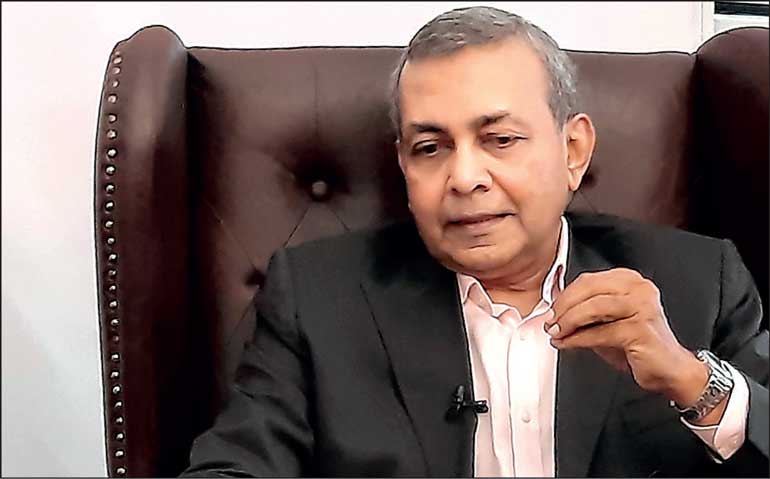Friday Feb 20, 2026
Friday Feb 20, 2026
Monday, 1 November 2021 00:00 - - {{hitsCtrl.values.hits}}

Business leader Alex Lovell – Pic by Lasantha Kumara
|
Business leader Alex Lovell is famous for having attracted several large and long-term investors into Sri Lanka. Among them is TPG, one of the leading global investment firms, which is now the largest shareholder of Union Bank Plc via Culture Financial Holdings with an 81% stake. Lovell is also a high net worth individual investor. Lovell counts over 30 years of experience in finance and investment banking. He is a Chartered Management Accountant, UK and holds a Post Graduate Degree in Business Administration. He was awarded the MBE (Most Distinguished Order of the British Empire) by the Queen of England for services to investment banking.
He was selected as the first business leader to be featured in ‘Market Pulse,’ a unique collaborative initiative by SC Securities Ltd. of Sampath Bank Plc and the Daily FT. Lovell was interviewed by SC Securities Assistant Management Investment Banking and Marketing Dilusha Gamage. Following are excerpts of the interview, the audio-visual version of which is also available on the SC Securities YouTube (https://youtube.com/channel/UCc1Mn6kJhtbdrsU4RfCO_eA) and FT social media channels including FT TV (https://www.ft.lk/ft-video/10520).
Q: Your thoughts on the Colombo stock market?
I am someone who believes in building assets and using the stock market for private investors to exit. The Colombo stock market has been doing exceptionally well for a number of reasons. The only drawback is that the CSE has not been able to attract a lot of the foreign funds. This could be due to macro-economic reasons whilst the instability of the exchange rate for most part of the year was a key factor. However I believe the outflows to date are temporary. When currency stabilises and macroeconomic fundamentals improve, foreign funds will come back as Sri Lanka is a great place to invest.
|
Q: The CSE’s All Share Price Index is at all-time highs after a decade. Is this sustainable? Is the market overvalued and too late for newcomers to invest?
The market capitalisation of the CSE is around $ 23 billion whilst our GDP is around $ 80 billion. Generally the market capitalisation of the stock market should be around 70% of GDP. In that context the CSE market cap is still very low in regional or global standards. So there is a lot of room to grow.
This growth will come if there are more listings as well as actively traded stocks. If authorities are successful in encouraging family businesses and other corporates to list, the CSE can achieve much greater heights than at present.
Q: The Colombo stock market has been resilient and outperforming the economy beset with the impact of COVID pandemic and external factors? How can this be explained?
Yes at times this bullish investor sentiment surprises even me but the good news is that the market is moving upwards with unprecedented volumes. Equity market performance has a correlation to interest rates. In Sri Lanka interest rates have been very low in the past year or so, so most investors consider the stock market as ‘go to’ place to get higher returns. Once interest rates rise, focus is likely to shift to banking sector deposits.
|
Q: Your outlook on interest rates?
It is a real challenge to the Monetary Board to ensure price stability as well as stimulate economic growth given the unprecedented pandemic and external factors. Interest rate is a big determining factor in this equation and I don’t like to predict.
Q: Whilst local investors are bullish, foreigners aren't as they have been net sellers. Can the CSE sustain itself without foreign funds?
Foreign funds and high net worth individuals are very sophisticated investors. There are a number of reasons why they want to invest, including growth of the economy, companies, and exchange rate stability. When there is turbulence in one of these factors, they tend to stay away, which is rightly so because it is their money and intention is to create value. As a result, foreign money tends to fly away1 and when things are settled they will return.
To sustain a robust market without foreign funds and investors will be very challenging. Entry of foreign funds has been a catalyst for emerging markets to grow and we have seen it in the past in Sri Lanka too.
|
Q: The Colombo stock market has seen a large number of IPOs this year with more to follow. How do you see this development?
As long as some of the local companies listing have fundamentals right in terms of revenue and profit growth and governance, there will always be investor demand. Captive funds such as pension and insurance funds, EPF and ETF to grow value also need new equities investment to ensure better asset allocation. Perhaps these funds need to increase their exposure to fundamentally strong equities and I hope the CSE will see a more active involvement by these long-term investors.
When listing, what is important is that there must be a good story to tell investors. What have you done in the past and what are you going to do in the future? How are you going to protect shareholder interests and improve governance structures? A listing which covers all these facets and gives investors the confidence that they will be attractive will bring stability to the market. Attracting quality companies is important. The SEC and the CSE have done a lot to improve governance of listed companies.
Q: How can new listings attract institutional investors, especially foreign?
To attract foreign investors in the short term may be very challenging. However, if a new listing or existing company has dollar- or foreign currency-based revenue such as Expolanka, they could be attractive for foreign investors.
When I first invested in 2007, the US Dollar exchange rate was Rs. 108. Those investments are worth only half that value. However, being born and educated in Sri Lanka I am a long-term investor and will continue to be. But there are also types of investors who prefer higher growth or consistent appreciation or want distribution by way of dividends.
Q: As investors want real returns, how do you see the outlook for the economy?
It remains challenging and part of the reason could be that we did not address issues much earlier or proactively in anticipation of tough times ahead. It is like having neglected a wound and it turning cancerous, treatment for which is complex and challenging.
I see a slight hard road ahead. However it is not impossible to rectify various issues that the country is facing. It needs a lot of courage, thinking and discipline. The world has seen how countries have progressed through difficult times. We are an import dependent economy, especially oil.
Sri Lanka is also not the epicentre of the world for investments. There are so many countries such as Bangladesh, India, Pakistan, Thailand, Indonesia and Malaysia. We are fighting for the same dollar. The challenge is to make Sri Lanka more attractive. To do this we have a lot of strengths. Tourism is one. Our strategic geographic location is another where Sri Lanka can become a hub for third party logistics to Asia and the world. We have the potential to attract some very large investments.
|
Q: What is the ideal role of institutions such as BOI?
We opened the economy in 1977 and over the years starting from GCEC and now the BOI, there has been a reasonably good effort in attracting Foreign Direct Investments. But we have to do more to realise our full potential. Sri Lanka also needs to improve our sovereign rating. Sri Lanka has to come out and tell the world that we have a three- or four-year strategy to improve our rating to a specific grade with constant dialogue with investors. This will help boost foreign portfolio and direct investments to Sri Lanka.
To quote from the Union Bank example, there was a stage when its rating was downgraded to B+ which brought in a lot of challenges. None of the insurance companies would deposit with us, some public withdrew theirs, and we had to borrow at expensive rates, all of which impacted profitability and credibility. However, we made a concerted effort to work on improving and today we have got to a BBB+ rating. Likewise the country too must work diligently to improve its rating, addressing all relevant issues.
Q: What are your views on the banking sector?
I am an investment banker by profession. The banking sector is one of the safest, soundest and best governed. This is thanks to continuous efforts by the Central Bank. It is the non-banking financial sector that has issues. There are too many NBFIs even after the first round of consolidation a few years ago. This sector remains stressed and if addressed there is an upside.
|
Q: The financial services sector is being threatened with high Non-Performing Loans due to the pandemic. Yourtake on that?
Yes it is very challenging, especially if one's exposure to the hospitality sector is high. But an early and sustained revival of the tourism sector following pent-up demand owing to 18 months of pandemic-induced travel restrictions will help ease the stress. Sri Lanka is a great tourist destination.
Q: The Port City is Sri Lanka's iconic venture – How can it be made successful?
It is a welcome initiative provided we develop and position it properly with the full gamut of offerings such as financial, office, leisure, living, entertainment, etc. There are a lot of multinationals based in Hong Kong who are looking at relocation. This is an opportunity for Port City as Sri Lanka is a far better destination.
The relocation shift however must be incentivised via tax sops. It is not the buildings that attract MNCs but the nitty-gritty of details, the tax policy, the living environment and social ecosystem. Asia-based MNCs relocating in Colombo will have a huge positive multiplier effect.
Q: CSE is also expanding its product portfolio from just basic equities; how do you see it?
This is very encouraging. For example, there is more debt trading in the Malaysian stock market than equities. Commodities, gold trading and REITS are excellent opportunities. Yes REITS is the first, but I understand there are few teething issues to be sorted out. It is a long-term transformation process to diversify investment opportunities at the CSE.
|
Q: What does the future hold for Lankan equities?
Every market, every country, goes through issues. Sri Lanka too needs to address them diligently so the road ahead isn't too difficult. It might require making hard decisions, the benefits of which will be enjoyed in the future. Judicious assessment of balancing politics and economics must be paramount. The country as a whole must have a proper roadmap.
Q: Your advice to investors, especially newcomers to the stock market?
Take a long-term view with clear understanding. We have so much room to grow and Sri Lanka can be a more prosperous and inclusive nation in three to five years from now.
